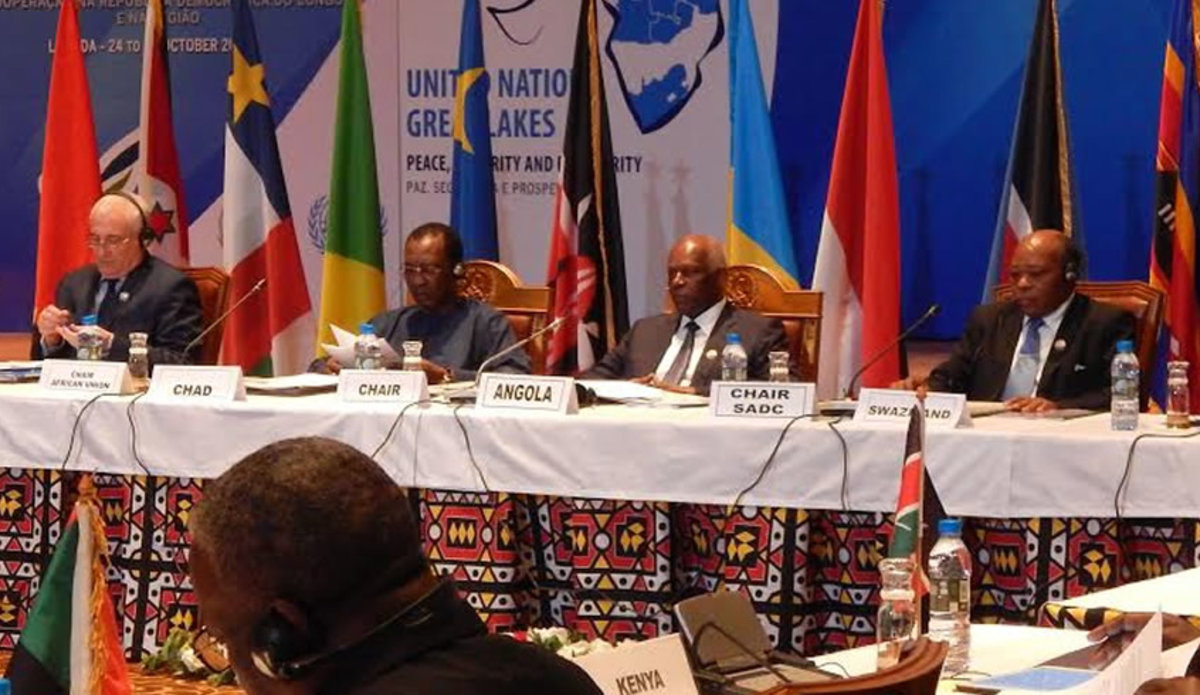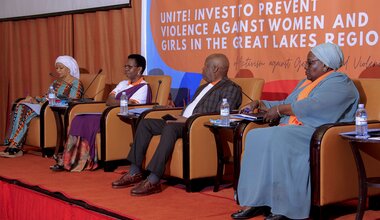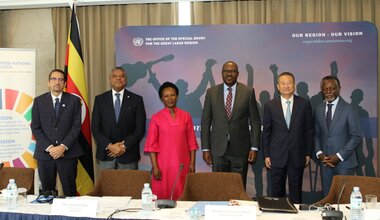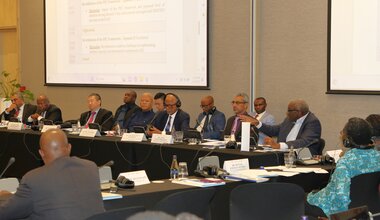Leaders of Africa’s Great Lakes convene in the Angolan capital to review regional political and security developments, and make headway on peace processes
Luanda, 26 October 2016 - Heads of State and Government of Africa’s Great Lakes met today in Luanda, Angola, under the chairmanship of Angolan President José Eduardo dos Santos in his capacity as chairman of the International Conference on the Great Lakes Region (ICGLR) to review political and security developments in the region, particularly in the Democratic Republic of the Congo (DRC), Burundi, the Central African Republic and South Sudan. The countries represented at the summit were the 13 signatories of the Peace, Security and Cooperation (PSC) Framework agreement for the DRC and the region signed in Addis Ababa in February 2013.
Among the high ranking officials in attendance were five Heads of State, including President dos Santos; Idriss Deby Itno of Chad; Denis Sassou Nguesso of the Republic of Congo; Joseph Kabila of the DRC; Edgar Lungu of Zambia; the Vice-Presidents of Burundi and the Republic of Sudan; the Deputy President of Kenya, and the Prime Minister of the Central African Republic. Also present at the high level were the Chairperson of the African Union (AU), Nkosazana Dlamini-Zuma, and the United Nations (UN) Special Envoy for the Great Lakes region, Said Djinnit.
The heads of State and Government were in the Angolan capital for their seventh meeting under the Regional Oversight Mechanism (ROM). The ROM is the main oversight body under the PSC Framework, which meets once a year at head of State and Government level to review progress on the implementation of the national and regional commitments under the peace agreement.
The leaders of the region agreed that the PSC Framework remains a vital mechanism to achieve durable peace and stability in the DRC and the region, and renewed their full commitment to its implementation. Key among the agreements reached were the following:
Women’s Platform for the Peace, Security and Cooperation Framework for the DRC and the region
While recognizing that sustainable peace is unattainable in the absence of women, they recommitted to strengthening the role and participation of women in political and development processes in the Great Lakes region.
Judicial cooperation
Noting recent positive steps in enhancing judicial cooperation in the region, they stressed the need to pursue those efforts to ensure effective progress in the fight against impunity for crimes and violations of human rights, including sexual and gender-based violence.
Regional development
The leaders welcomed the recent launching of the Great Lakes Regional Strategic Framework on the prevention and resolution of conflicts, and encouraged the United Nations to continue to streamline and harmonize the efforts of its various entities, in close consultation with the countries of the region, with a view to supporting development efforts throughout the Great Lakes region.
Neutralization of negative forces and repatriation of disarmed combatants
They noted with satisfaction the ongoing cooperation and joint operations of the Armed Forces of the Democratic Republic of the Congo (FARDC) and the United Nations Stabilization Mission in the DRC (MONUSCO), especially against the Democratic Forces for the Liberation of Rwanda (FDLR) and the Allied Democratic Forces (ADF), and encouraged them to further strengthen their cooperation.
Relations between countries of the region
They encouraged countries of the region to intensify their efforts aimed at improving relations through bilateral channels and existing regional mechanisms. In this regard, they welcomed recent high-level meetings between leaders of the region to enhance confidence and cooperation between their countries.
On Burundi
They reiterated their support to the East African Community facilitation led by former President of Tanzania Benjamin Mkapa while looking forward to the early resumption of the dialogue.
Central African Republic
The heads of State and Government welcomed the efforts by the Government of the Central African Republic (CAR) to promote dialogue and reconciliation and extend state authority throughout the country; they called on all armed groups to engage in dialogue with the national authorities to ensure peace and stability.
South Sudan
The summit expressed concern at renewed fighting between forces of the Sudanese government and Sudan People’s Liberation Movement/Army in Opposition (SPLM/A-IO), as well as intercommunal violence in several parts of the country. The leaders of the region also called on all South Sudanese stakeholders to immediately cease fighting and continue to implement the commitments undertaken in the Agreement for the Resolution of the Conflict in South Sudan.
The leaders agreed that the next high level meeting on the Peace, Security and Cooperation Framework will be take place in the Republic of Congo.
 UN
UN





